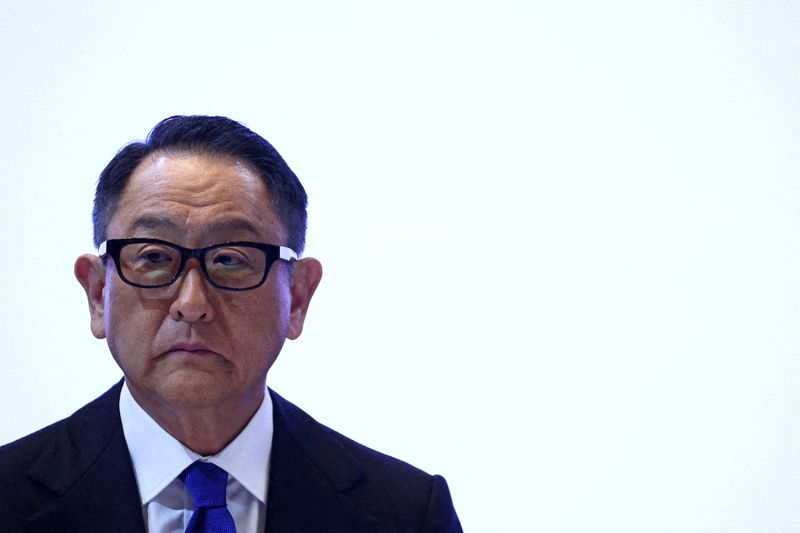By Maki Shiraki and Daniel Leussink
TOYOTA CITY, Japan (Reuters) -Toyota Chairman Akio Toyoda and nine other members of the automaker's board were re-elected at an annual general meeting on Tuesday, with shareholders shrugging off concerns about governance and certification test scandals.
Two leading proxy advisers had recommended against Toyoda's re-election. But his re-appointment was widely expected given shareholdings in the automaker owned by other Toyota (NYSE:TM) group firms, record business results and his popularity among Japanese retail investors.
That said, any big drop in shareholder support for Toyoda - a figure which will be released on Wednesday - will not only be embarrassing but could spur further action on governance reforms. Analysts have cited an acceleration of efforts to unwind cross-shareholdings as one possible outcome.
Toyoda's approval rating fell to 85% last year from 96% in 2022. Since then, the world's biggest automaker has been bedevilled by a spate of safety and other certification testing violations at group firms including small car maker Daihatsu as well as at its parent company.
Proxy adviser Institutional Shareholder Services (ISS) had taken issue with the way the automaker has dealt with problems.
New York City's public employee pension funds, for example, agreed with that stance and voted against Toyoda.
"Setting a tone at the top is critical," Michael Garland, who oversees corporate governance for the funds, said in an emailed statement.
Glass Lewis, which had recommended that Toyoda not be re-elected for a second year in a row, said that he was responsible for the board's lack of independence and also cited concerns about its strategic shareholdings and return on equity.
Most of any opposition to Toyoda is expected to have come from overseas investors, which account for a quarter of Toyota's shareholders.
But Toyoda, who is the grandson of the company's founder, remains deeply popular among retail investors, which account for 12.6% of the automaker's shareholders. Last business year's record profits and a strong stock performance have also worked in his favour.
"I bought Toyota shares with my retirement bonus," 84-year-old Hidenori Takahashi told Reuters ahead of the meeting, adding he believed it was the "best company in Japan" for shareholders.
He said the ongoing certification issues that have roiled the automaker were "a bad thing" but that Toyoda seemed eager to take steps to prevent the wrongdoing from recurring.
More certification irregularities have come to light since the proxy advisers made their recommendations.
In early June, Toyota said it had wrongly conducted six different vehicle certification tests in the past, including for three models that were still being sold.
Some of the tests were conducted under stricter conditions than those set out by the government, invalidating their results, it has said.
Toyota's shares have fallen 10% since the new revelations came to light, but are still up 18% for the year.

Toyota CEO Koji Sato, who succeeded Toyoda as chief executive last year, reiterated apologies for the certification problems, but neither he nor Toyoda addressed the recommendations from the proxy advisers directly.
Shareholders on Tuesday also rejected an investor proposal urging greater disclosure of climate lobbying that had been opposed by Toyota.